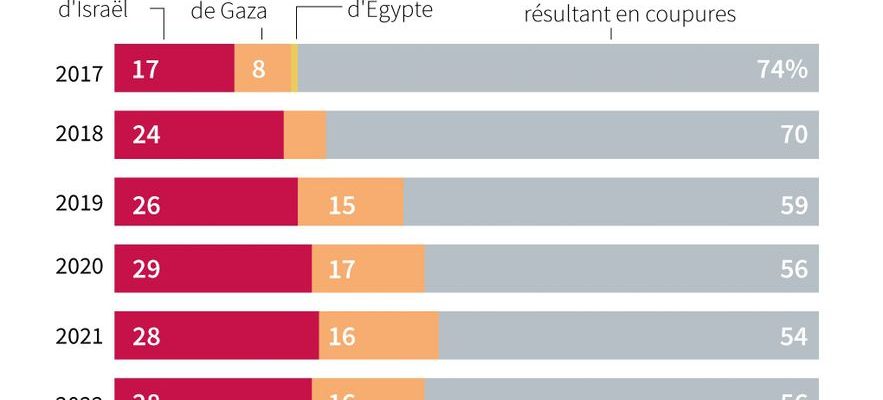Friday, October 13 in the morning, the Israeli army announced in a press release demanding the evacuation within 24 hours of “all Gaza civilians from their homes to the south for their own safety”, after 7 days of intense bombardments towards the Palestinian band led by Hamas. The UN was informed during the night of Thursday to Friday by the Israeli army of an order to “relocate” towards the south of more than 1.1 million civilians from the north to the south. The organization’s secretary general called for the order to be immediately rescinded, to no avail.
He warned that an evacuation of such a scale was “impossible without causing devastating humanitarian consequences.” “You will only be allowed to return to Gaza City when another announcement permitting it is made,” the Israeli statement said.
More than 423,000 people have already been displaced in the Gaza Strip to flee Israel’s incessant bombings, according to the UN, which has launched an emergency appeal for donations worth $294 million to meet “urgent needs”. ” of the Palestinian territories.
Around 1,200 deaths have been recorded in Israel since the bloody attack by the Palestinian Islamist movement on October 7, which left more than 150 hostages dead. On the Palestinian side, there are more than 1,400 dead according to Hamas, including many Gazans civilians.
A ground attack on Gaza?
A few hours earlier, Israeli Prime Minister Benjamin Netanyahu had promised, after an interview in Tel Aviv with American Secretary of State Antony Blinken, to “crush” Hamas as was the Islamic State, receiving the strong support from the United States. Statements which suggest a ground offensive in Gaza against Hamas.
Tens of thousands of Israeli soldiers are already deployed around the strip of land and on the border with Lebanon, a country from which pro-Iranian Hezbollah, an ally of Hamas, regularly launches rockets. The Israeli army announced that it had shelled the enclave controlled by Hamas, an organization classified as “terrorist” by the United States and the European Union, since Saturday with 4,000 tons of explosives and 6,000 bombs.
The enclave short of power and drinking water
“The only power plant in the Gaza Strip ran out of fuel and stopped working, cutting off the only source of electricity” in the enclave where most residents “no longer have access to electricity.” “drinking water”, reported the United Nations agency for Palestinian refugees (OCHA). According to this organization, a water reservoir and a desalination plant were hit by airstrikes. “UNICEF indicated that some began to drink sea water, which is very salty and contaminated by 120,000 m3 of untreated wastewater every day,” the press release added.
In Gaza, a chronic lack of electricity
© / afp.com/Maxence D’AVERSA, Laurence SAUBADU
The UN Security Council meets
The UN Security Council is due to meet in New York at the initiative of Brazil, which holds the rotating presidency of the institution, to address the situation in the Gaza Strip. A first meeting of the Council, on October 8, did not result in any unanimous condemnation of the Hamas attack. The presidents of the European Commission Ursula von der Leyen and of the European Parliament Roberta Metsola are expected in Israel today to “express their solidarity with the victims of the Hamas terrorist attacks and meet Israeli leaders”, the day after a visit by Secretary of State Antony Blinken. The heads of German and French diplomacy, Annalena Baerbock and Catherine Colonna, are also due to visit Israel, on Friday and Sunday respectively.
‘New front’ against Israel will depend on situation in Gaza: Iran
The Iranian Foreign Minister, whose country supports Palestinian Hamas, indicated Thursday that the opening of a “new front” against Israel in the Middle East would be conditional on the “actions” of the Israeli state in the Strip. Gaza, shelled by Israel. Iran is at the center of attention for its unreserved support of Hamas. If Tehran has long supported the Palestinian Islamist movement, Iranian leaders claim not to be involved in the attack it launched on Saturday against Israel, sworn enemy of the Islamic Republic.
However, the United States fears the opening of a second front in northern Israel on the border with Lebanon, if Hezbollah, ally of Hamas and supported by Iran, decided to intervene massively. The head of Iranian diplomacy arrived in Beirut on Thursday, where he was received by representatives of Hezbollah and Hamas, among others. He is due to meet with Lebanese officials on Friday before traveling to Damascus.
From Beirut airport, he reiterated that Iran’s regional allies (Syria, Hezbollah, Hamas and other groups), known informally as the “Axis of Resistance,” could respond in the event of an escalation of the Israeli offensive in Gaza.
